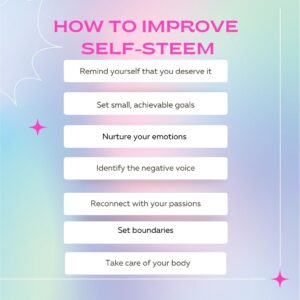
We all face moments of self-doubt, and for some, battling low self-esteem can be a constant challenge. Regardless of your journey with self-esteem, here are some practical steps to help you boost your confidence.
1. Remind yourself that you deserve it
One of the biggest challenges in improving self-esteem is believing that you can! Low self-worth convinces us we don’t deserve to feel good, making it hard to change. Begin by recognizing your desire for positive change and tell yourself, “I deserve to feel good about myself.” It may seem untrue at first, but gradually, it can shift negative thinking. Remember, you are worthy of your own love. Just as you would love and support a friend or child unconditionally, work on loving yourself just as you are right now.
2. Set small, achievable goals
Accomplishing goals, even small ones, can do wonders for confidence. Instead of setting massive, overwhelming objectives, break them into manageable steps. For instance, if you want to become more organized, instead of tackling everything at once, focus on completing one small task each day. This approach helps you feel accomplished and gradually leads to bigger results.
3. Identify the negative voice
Many of us have a critical inner voice pointing out our flaws, but this isn’t something we were born with. This negativity usually stems from past experiences, such as feedback from parents, bullies, ex-partners, or societal messages. By identifying where this voice comes from, you gain power over it. Name the voice or label it to remind yourself it’s not part of you. This can help you distance yourself from the negativity and gain the motivation to counter it.
4. Reconnect with your passions
Whether it’s art, reading, sports, music, or animals, we all have activities that ignite our passion and joy. Re-engaging with what you love can give you a boost of confidence and energy, helping you reconnect with what makes you feel alive and fulfilled.
5. Take care of your body
Caring for your body goes beyond just exercising. Even small acts of self-care can make you feel better. If you’ve been neglecting yourself, start by establishing a simple routine like washing your face or moisturizing. Treat yourself to a relaxing bath or a massage, or invest in an outfit that makes you feel confident. Eating nutritious foods, staying hydrated, and doing a quick stretch in the morning can also contribute to feeling better physically and mentally.
6. Nurture your emotions
When a loved one is feeling down, we tend to respond with compassion and support. However, we often don’t treat ourselves the same way. Instead of being harsh, practice self-compassion. Do things that comfort you—take yourself out for a treat, watch a movie, enjoy a hot bath, or relive happy memories. Above all, be kind and patient with yourself when you’re feeling emotionally low.
7. Set boundaries
Sometimes, low self-esteem is influenced by those around us—negative friends, critical family members, toxic workplaces, or unhealthy relationships. If this applies to you, reflect on how you can set boundaries. This might involve cutting off harmful relationships, declining unnecessary commitments, or limiting exposure to negative environments. Setting clear boundaries allows you to protect your energy and feel more in control of your time and well-being.





